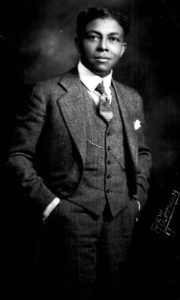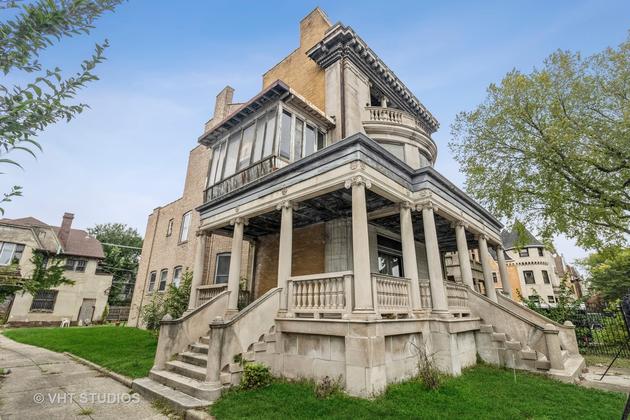Amid rows of greystones on Dr. Martin Luther King Drive sits a stately mansion that has been vacant for decades. The rotting plywood that covered elegant windows for so long will soon be removed, and Black Chicago’s most stylish and storied street will have another occupied mansion.
Last month, the seven-room neoclassical manse at 4806 S. King Drive was reportedly sold for $525,000 to Jeff and Stephanie Douglas, a longtime Bronzeville couple who want to restore it to its original splendor.
According to Crain’s Chicago Business, the buyers were represented by Bertina Power of Engel & Völkers Chicago. Stephanie is reportedly a Chicago Public Schools administrator, and Jeff is an executive with the Potbelly sandwich chain. The couple reportedly expects to spend a year rehabbing the property.
During a visit by a Crusader journalist Monday afternoon, February 28, workers were busy rehabbing the property as a dumpster sat in front of the coach house. The home’s limestone exterior has a wraparound porch with iconic roman columns and handsome balustrades. The utilities are reportedly working but need to be updated. The home also has its original woodwork, tile and stained glass.
The manse was owned by the family of Nathan K. McGill, a Black pioneer who was Illinois’ first Black assistant attorney general and attorney for the Chicago Defender under its founder, Robert S. Abbott.
The 4,000-square-foot residence is not an official Chicago landmark but was built in the 1890s. It has a coach house with a two-story apartment. The property has reportedly been in the McGill family since the 1930s.
In October, three brothers who are grandsons of McGill, put the property on the market at $500,000. One of the brothers, Winston McGill Jr., told Crain’s Chicago Business they had been planning a full rehab since their father’s death in 2006, but didn’t “think we can give it what it’s demanding.”

Born on November 29, 1888 in Quincy, Florida, Nathan McGill moved with his family to Sanford, Florida, while still a child.
His parents were poor; his father worked as a laborer. He was the younger brother of Simuel Decatur McGill, later a nationally known civil rights lawyer. Nathan McGill graduated from Cookman Institute, where he was reported to be a brilliant student. His oratorical skills were showcased in a 1908 eulogy he gave for Abraham Lincoln, which was later published in a pamphlet.
He enrolled in Boston University School of Law, where he graduated in 1912. He returned to Florida, practiced law and was admitted to practice at the U.S. Supreme Court. McGill also became publisher of the Florida Sentinel in Jacksonville from 1916 to 1920.
In 1917, he married Idalee Thornton McGill, sister of Robert Abbott’s first wife, Helen Thornton Abbott. They had two sons, Nathan K. McGill, Jr., and Simuel Decatur McGill II. That marriage ended in divorce before McGill married Beatrice Stiles in 1934 and the couple produced Winston B. McGill, Jr.
By 1918, McGill set up a law practice in Chicago. In 1925, McGill was appointed assistant state’s attorney for Cook County, becoming one of the first Blacks to hold the office. McGill served as Assistant Illinois Attorney General from 1929 to 1933.
In 1926, McGill was hired as general counsel and vice-president of the Chicago Defender. For nearly 10 years, McGill was Defender publisher Robert S. Abbott’s closest business associate. According to papers provided by one of his sons to the Chicago Public Library, McGill lived well at the mansion on King Drive, which was then named South Parkway. They had luxury cars and a vacation home in Paradise Lake, Michigan.
At the Defender, McGill participated in major decisions on hiring writers, increasing circulation nationally and expanding political relationships. He worked with Abbott on the early Bud Billiken parades and on Abbott’s Monthly magazine.
When Abbott suffered several bouts of ill health in the early 1930s, McGill reportedly served as the unofficial chief executive of the Robert S. Abbott Publishing Company.
According to library documents, in the summer of 1934, after Abbott’s nephew, John H. Sengstacke, arrived in Chicago, a serious rift developed between Abbott and McGill. On September 12, 1934, Abbott terminated McGill from all his positions with the Defender and Robert S. Abbott Publishing Company.

The newspaper published a statement that Abbott “has resumed complete management,” and that “Mr. N.K. McGill is no longer managing same.”
The cause of the breakdown in relations between Abbott and McGill is in dispute, according to library documents.
For nearly two years, McGill published his own newspaper, Metropolitan News. The paper was severely affected by the economic conditions of the Depression and closed in 1937. In the same year Abbot died in his own mansion several blocks north.
McGill filed for bankruptcy in 1940, with court proceedings that dragged on for the last years of his life. He died on May 7, 1946.
A scrapbook created by McGill was later found in the home. It contains clippings, programs, correspondence and memorabilia. Much of the material documents his own life, and the lives of his family members.
Legal documents from 1926 through 1945 were also found in the home with most of them concerning McGill’s divorce and bankruptcy proceedings, and proceedings related to Abbott’s estate.






